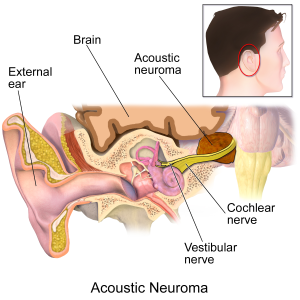One of the most common causes of tinnitus is inner ear cell damage. Tiny, fine hairs in your inner ear oscillate in relation to pressure of sound wave pressure. This causes cells to signal auditory nerves to your brain. The brain then reads these signals as sound. If the hairs inside your inner ear are damaged, they can emit random electrical signals to your brain and trigger tinnitus.
Other causes of tinnitus include other auditory problems, certain chronic health problems, brain injuries and injuries or conditions that have an impact on the nerves in your ear or the hearing brain center.
Common causes of tinnitus
In many people, tinnitus is caused by one of these conditions:
- Cumulative exposure to loud sounds. As stated earlier, loud sounds, such as from certain equipment, gunshot and artillery, power saws, are common causes of hearing loss. Portable music devices, used with ear buds, headphones or loudspeakers, can also cause hearing loss if played at high volumes for long periods of time. Listening to loud music with unprotected ears in bars, clubs or amplified music from concerts or shows, or listening to music from home loud speakers can also cause tinnitus. Tinnitus following short-term exposure, going to a loud club or concert, will in most cases be a short-term consequence. Long-term sound exposure can cause more long-term damage.
- Hearing loss. For many of us hearing worsens as we get older, with the onset being around age 60. Reduced hearing capacity can also cause tinnitus.
- Earwax. Your ear canal is shielded by earwax which traps dirt and slows the growth of bacteria. A buildup of too much earwax may cause hearing loss or irritation to the eardrum, which can also lead to temporary tinnitus, easily remedied by removing the earwax blockage.
- Ear bone changes. Otosclerosis, or hardening of the middle ear bones, may have a negative impact on hearing, and also trigger tinnitus as well. Otosclerosis, research has shown, tends to be hereditary.
- Meniere’s disease. Tinnitus may also be a symptom Meniere’s disease, an inner ear disorder that can also cause vertigo and other symptoms.
- TMJ disorders. Jawbone problems at the tempero-mandibular articulation point, where the jawbone meets your skull, can cause tinnitus.
- Head injuries or neck injuries. Head traumas, concussions or neck injuries can affect the inner ear, usually causing tinnitus in only one ear.
- Acoustic neuroma. Is a non-cancerous benign tumor developing on the cranial nerve that runs from your brain to your inner ear, and controls balance and hearing functions. Also called vestibular schwannoma, this condition generally causes tinnitus in only one ear.

- Dental Work. Dental work can also cause tinnitus. There is also research to indicate that dental fillings containing mercury and other metals are a cause of tinnitus.
Other rarer causes of tinnitus:
Blood vessel disorders causing tinnitus – Pulsatile tinnitus is a rarer type of tinnitus caused by certain blood vessel problems. Pulsatile tinnitus may be caused by the following:
- Head or neck tumors. Pressure on a blood vessel as a result of a tumor in your head or neck, may result in several symptoms including tinnitus.
- Atherosclerosis. An accumulation of cholesterol and other fatty deposits due to the aging process may also cause blood vessels to occlude in both the middle and inner ear resulting in loss of vascular elasticity. As a result, blood flow through the vessels is pumped with more pressure, enabling you to sometimes hear the actual beats. This type of tinnitus is generally experienced in both ears.
- High blood pressure. Emotional stress, caffeine and alcohol can aggravate hypertension and increase tinnitus levels.
- Turbulent blood flow. Narrowing or partial occlusion of a carotid artery or jugular vein in the neck can cause irregular blood flow and in turn cause tinnitus.
- Malformation of capillaries. Tinnitus may also be caused by arteriovenous malformation (AVM), when abnormal connections form between arteries and veins.
This type of tinnitus is primarily found in only one ear.
